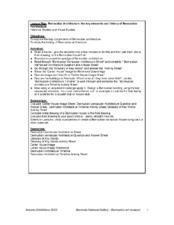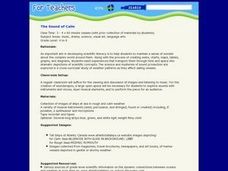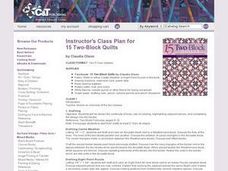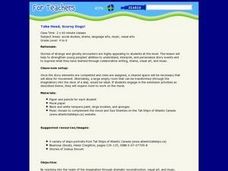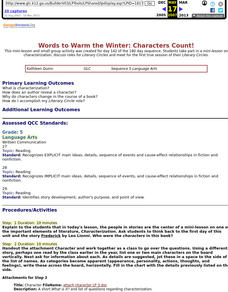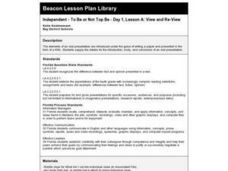Curated OER
Storm on the Sea of Galilee
Students analyze music paying particular attention to how the composer suggests the idea of water in the composition of the piece.
Hawaiʻi State Department of Education
Symmetrical Objects
In order to better understand how to locate a plane of symmetry in 3-dimensional objects, learners create a dance. The class reviews dance and math symmetry, then they practice making symmetrical shapes and movements with a partner. They...
Curated OER
Weather Dance
Students study weather and focus on specific dance concepts. They are introduced to different ty es of clouds and how they are formed. Next, they study wind and why it occurs.
Curated OER
Mapas Bailados: Creating Visual Representations of Dances Using Maps
Third graders listen to "Frank the Monster..." and discuss the dance map on the inside cover of the book. They create their own dance map using sentence strips to record the types of movement.
Curated OER
Bermudian Vernacular Architecture
Students, after researching, discussing and analyzing vernacular architecture in detail, answer a question and answer sheet, review an extensive vocabulary of key words, complete an activity sheet on the key words, and critique a...
Curated OER
Renkly Relief/Collage Painting
Students study the use of texture, and rhythm as a principle of design when showing movement in a painting.
Curated OER
The Sound of Calm
Students examine the relationships that exist between ocean currents, wind and climate. Using those relationships, they discuss how they affect the oceans. They create their own music to represent the sounds of the ocean and share them...
Curated OER
Scriptwriting With A Wiki
Students use a website to add and edit content. They work together to create a one-act play. They view their creation to end the activity.
Curated OER
MYSPACE Profiles - Romeo and Juliet Characterization
For this Romeo and Juliet worksheet, students create a MySpace website as a characterization analysis for the play Romeo and Juliet. Students complete a characterization sheet for the activity.
Curated OER
Buildings, Buildings Everywhere
Students gain awareness of shapes in architecture by creating a painting of their school and writing a reflective summary of their study of architecture.
Curated OER
Geo-Vistas
Students create a geometric cardboard sculpture covered with personal drawings.
Curated OER
15 Two-Block Quilts
Students create two block quilts after studying about continuity of lines, use of coloring, and highlighting adjacent pieces. Students complete the design into the border. Students cut the required material pieces to create their quilt...
Curated OER
The Journey of Sacagawea
Students examine the life of Sacagawea, the exceptional woman chosen to appear on the Golden Dollar, and write journal entries based on their research.
Curated OER
Take Heed, Scurvy Dogs!
Pupils examine the use of ghosts in shipping stories. As a class, they assign roles and they act them out in a play. They make it seem as if they are in danger on their voyage and work together to create a script. They ask questions...
Curated OER
Words to Warm the Winter: Characters Count!
Fifth graders take part in a mini-lesson on characterization, discuss roles for Literary Circles and meet for the first true session of their Literary Circles.
Curated OER
Introduction to Melodic Notation: Sol-Mi
Second graders sing melodic sol-mi songs for teacher and student assessment. Emphasis is placed on drill and practice while developing melodic singing skills. Students evaluate performances and activities using pre-determined rubric...
Curated OER
Still-Life Painting: Arranging Nature
Students examine and discuss still-life paintings and develop a definition for the genre. They paint their own still life paintings from direct observation.
Curated OER
Creating Sacred and Ritual Masks Within the High School Pottery Classroom
Learners research sacred masks and what they were used for. They are to create their own sacred mask and present them to the class.
Curated OER
Let Me Convince You
Students discuss the purposes of persuasive speaking and writing with emphasis upon what makes them different from other kinds. They brainstorm and discuss ways to select "The Greatest American Who Ever Lived" and prepare a persuasive...
Curated OER
Comparing Cinderella and Yeh-Shen
Fourth graders read and discuss the English version of Cinderella and the Chinese version, Yeh-Shen by making a Venn diagram.
Curated OER
Independent - To Be or Not Top Be - Day 1, Lesson A: View and Re-View
Second graders explore the introduction, body, and conclusion of an oral presentation.
Curated OER
Feelin; a Groove
Students compare and contrast two versions of April in Paris. They discuss the songs in terms of the grooves each one captures and identify the instruments responsible for creating them.
Curated OER
Enslaved and Running
Young scholars use runaway slave advertisements to discover how the language varies from the 18th to 21st century. Using primary source documents, they research the brutality of slavery and the desire of those in slavery to be free. ...
Curated OER
A Paragraph Organization Exercise
Students examine sentences and rewrite them in the most logical order. Each sentence should be connected to the next, both logically and rhetorically.They look for methods the author has used to organize and develop his ideas.
Other popular searches
- Art Elements Space
- Elements of Art Space
- Elements of Art (Space)
- Elements of Visual Art Space
- Art Element Space
- Space Element of Art






